|
by Srijon Mukherjee Twelfth grade was a time when, after I'd come across and finished obsessing over most classic rock bands, I was starting to feel a little exasperated, having been used to discovering a new band every half hour. Too familiar with the 60s and 70s, irritated by the 80s zeitgeists, and worn out by the 90s and 2000s, I suddenly came across a small brand of awkward stalwarts from Britain - the 80s alternative bands. While Jesus And Mary Chain, The Cure, and R.E.M hit me pretty hard, it was The Smiths that led the cultural mob awakening in my head. I still remember the first time I came across The Smiths. I was sitting alone in a room, surfing YouTube as usual, confusedly enjoying the weird ennui that creeps through your body when you click on one link too many, for one minute too many. What struck me first, about them was the lead singer, Morrissey- well, obviously. He sang with a posh, sophisticated accent that- coupled with a baritone and thoughtful lyrics different from the norms - resonated with the late 70s post-punk guitar chords and gave the band an extremely distinguishable sound and feel. I was always for bands that subverted mainstream ideas - call me a hipster if you will but you can’t deny its importance in art - and no one did it as elegantly as The Smiths. No, seriously, no one did. I apologize if I’m beating a dead horse, but I need this point to get through: every time I listened to The Smiths, and all their “anti-pop” ideas, I found myself imagining them drinking tea, aware, but unfazed at how quickly they’d become the voice of the youth. The first album I heard was Queen Is Dead, and three years and more than fifty band obsessions later, it’s still one of my most treasured indie albums. It released in 1986, a year after the famous Live Aid Concert, a concert so highly popular and radio friendly, that everyone had all but forgotten that music can also have functions in dissent - quite a thing too, since this was also the birthplace of The Sex Pistols. As Jon Savage put it, in his reflections on those times, in an article for The Guardian: “Acid house was still underground, while the Live Aid effect had smeared middle-brow values all over rock music. There was surprisingly little dissidence expressed in popular culture, as the onset of CD software inaugurated a wave of retro marketing.” The album sets off with the title track, a snarky protest against monarchy, and an amused account of the rift between the Queen and her subjects. It’s also a perfect introduction to the album - a song that’s as political as can be, but also interspersed with subtle personal reflections. The Smiths had already made a reputation for being anti-monarchy, and left wing sympathizers, and in Queen Is Dead, they’re at their graceful best, skipping the blunt, ferocious road that Sex Pistols took in their famous rant God Save The Queen, but not hitting any less hard. The song features a sample of ‘Take Me Back To Blighty - an old popular song from 1926 that laments about homesickness and a longing to return to Britain - and soon interrupts it with feedback and loud drum beats, and mocking lyrics. As Morrissey snarkily sings with his heavy baritone: "..Past the pub who saps your body And the church who'll snatch your money The Queen is dead, boys And it's so lonely on a limb Past the pub that wrecks your body And the church, all they want is your money The Queen is dead, boys And it's so lonely on a limb" It is worth noting that these lines, while obviously talking about the relation between the Queen and her subjects, also fall into place with the themes of alienation, and melancholic moods that The Smiths are known to incorporate within their songs. Safe to say, this is one of their most well-known and important songs. I have a theory, that any good band will have at least one song against a music industry, or the music executives (Porcupine Tree, Pink Floyd, Rush). ‘Frankly Mr Shankly’ is one of those tracks; though it's ilight-hearted, it also makes a few pertinent reflections. It’s typical Morrissey poetry- embedding something that can be universally felt, within specific subject matter. Written about their former record executive, Geoff Travis, Morrissey sings about the “god awful” poetry he was sent by him - calling him a ‘flatulent pain in the arse’ - and in turn, reminds us of the importance of experiencing and being unashamedly human, when he sings: "Fame, fame, fatal fame It can play hideous tricks on the brain But still I'd rather be famous Than righteous or holy, any day Any day, any day But sometimes I'd feel more fulfilled Making Christmas cards with the mentally ill I want to live and I want to love I want to catch something that I might be ashamed of" The song has a clever and sharp tone to it, with a catchy bridge that makes it a fun listen, and a much-needed bridge between ‘Queen Is Dead,’ and the third - and one of the best - track of the album, ‘I Know It’s Over.’ The Smiths were well-known for being a band shrouded in despair and hurt. They were witty and humorous as well, but their brand of humor - more often than not - added to the gloomy undertone they always carried, about being misunderstood and deserving more. 'I Know It’s Over’ hits us fans the hardest, as Morrissey croons to himself, calling himself out over his insecurities, setting a chain reaction among all his devoted listeners. It’s a moment of vulnerability and self-flagellation that is horrifically fitting, for Morrissey himself, and all of us. Johnny Marr’s simple chords are perfect; nothing more is needed, as Morrissey provides one of his best vocal performances - almost poetic in its ups and downs. And it continues. The next track, ‘Never Had No One Ever’ is almost a telling of the aftermath of ‘I Know It’s Over.’ After all the hurt and self-flagellation for being alone is done, what do you do? You focus on the most important point of it all - how lonely you are. It’s as if Morrissey is tired, too tired to even ask why, and all that matters is he doesn't feel close to anyone and never will. It’s intense, and the beautiful arrangements by Johnny Marr, again, never fail to deliver. In the end, the slow, drawl of a rhythm, and Morrissey’s tired sighs, make for a very scary and picturable climax. After two draining emotional breakdowns, Morrissey decides that a change in atmosphere is much needed, as he starts ‘Cemetry Gates’ by singing, “A dreaded sunny day/So I meet you at the cemetry gates/Keats and Yeats are on your side/While Wilde is on mine,” poking fun at his almost constant melancholic moods, by calling a day full of sun ‘dreaded.’ The wordplay in the next few lines is evident, and is also an innovative way of providing a setting for the two people in question: Morrissey, being the obvious cynic, is more inclined to Oscar Wilde, and the other, romantic and more optimistic about life, on the side of late Romantic poets Keats and Yeats. The song also provides an interesting message on plagiarism. In the second verse, Morrissey sings: "You say : “Ere thrice the sun done salutation to the dawn And you claim these words as your own But I've read well, and I've heard them said A hundred times (maybe less, maybe more) If you must write prose/poem The words you use should be your own Don't plagiarise or take "on loan" The irony of this is, in the chorus, Morrissey himself borrows lines from the 1942 film “The Man Who Came To Dinner,’ when he sings: "All those people, all those lives Where are they now? With loves, and hates And passions just like mine They were born And then they lived And then they died It seems so unfair I want to cry" Morrissey seems to addressing critics who pan works when they notice obvious influences and imitation, saying that no work can come free of any type of impersonation, and even the critics who do so, are guilty of it in some way. The mention of Wilde - who had his own share of plagiarism allegations against him - makes even more sense now. And then we have ‘Bigmouth Strikes Again’ - Morrissey’s most appropriate autobiography, where he sings about his . . . no points for guessing what. We’ve all realized by now how passionately opinionated he is about almost everything in general, and with typical wit and snark, he sings about a save gone wrong: "Sweetness, sweetness I was only joking/When I said I'd like to smash every tooth/In your head" Morrissey’s quote about being controversial makes this an even funnier listen; he once said in an interview: "I've never intended to be controversial, but it's easy to be controversial in pop music because nobody ever is." The song features an insane riff by Johnny Marr, that, if heard separately, would never seem like it could sync with Morrissey’s tune. I read somewhere that Morrissey and Marr used to make their music separately and then try converge it together into a track, and it shows here. Their music as a result, is quite unpredictable, with the listener having no idea what changes are coming next- but still very seamless and coherent. And now for one of my favorite The Smiths tracks, ‘ The Boy With The Thorn In His Side.’ Morrissey’s been targeted by the media for a long time, because of his confused sexuality (The Smiths have songs that are mostly gender neutral, and are known to prefer homoerotic themes), his comments, and lyrics. In ‘Boy With The Thorn In His Side,’ he softly addresses that, claiming that his critics will find a ‘murderous’ desire for love, if they look beyond the hatred that they always seem to find reflected on his face. Though Morrissey sings, “How can they look into my eyes and still they don’t believe us,” earlier in the song, he changes the ‘my’ and ‘me’ to ‘our’ and ‘us,' singing in plural - he knows he’s not the only one suffering. It’s a song about having problems; being misunderstood, having something to say or desire, and having it read off of your face, without being allowed the chance to say it yourself. The soft vocals, along with the arrangement is perfect, and The Smiths once again prove their maestro status using minor chords. The seventh track of the album, 'Vicar In A Tutu,’ is an underrated track that’s only fault was to be included in an album of instant musical classics. It tells a tale of a thief, who while stealing from the church, notices the vicar wearing a tutu. He finds the sight ‘blistering,’ the irony of which is amusing: he was stealing and committing a crime as he made this observation on another person. As Morrissey sings, “He's not strange/He just wants to live his life this way,” the message is clear: this is a celebration of all things different. It’s one of those songs that need to be out there, celebrating sexual liberation, and freedom to do, wear and say whatever you feel like, regardless of your gender. The slow drum-led rockabilly chords, and the under-produced mixing of the song makes it a raw three minute escape for the listener. The fact that it’s a vicar, is a below the belt hit at the church - we all know of its opinion on homosexuality and its horror - and Morrissey doesn’t just stop there; he takes a suggestive hit at the church’s money making schemes when he sings, “As Rose collects the money in a canister/Who comes sliding down the bannister ?” - a theme we’ve seen before in this album, when Morrissey sang “Passed the pub that saps your body/And the church who'll snatch your money,” in the title track. And we’re here. We’ve arrived at probably the most popular Smiths song ever, ‘There Is A Light That Never Goes Out.’ Almost everyone’s heard this song somewhere(Courtesy: 500 Days Of Summer, usually). It’s THE Smiths anthem, and one of the most powerful celebrations of the fearlessness that the youth can display, in spite of heavy alienation. It’s a shoutout to all those who sit in their homes, overcome with social anxiety, but still venture out; maybe once or twice, surprising even themselves with this constant source of hope and wonder that keeps them going. And who better to sing of this than Morrissey? After everything he’s sung about in this album, political scander, depression, liberation, it all culminates to this - a celebration of life. As he sings, “And if a double-decker bus/Crashes into us/To die by your side/Is such a heavenly way to die,” you can tell that this is much more than just a wish to die beside one’s muse: It’s the welcoming of whatever may happen, because in the end, we’re all in an adventure here. What they don’t tell you is that an adventure can be anything, you can sit at home for fifty years, and then maybe venture out to water your plants one day, and there you have it. That’s your adventure. And we all have our own. There is a light that never goes out. If I ever have my own ‘Perks Of Being A Wallflower’ moment, this is the song that I’d want to bellow at the top of my lungs, standing on a moving car with my arms spread out. Because this feeling of hope, and the light it bears, is indeed, infinite. ‘Some Girls Are Bigger Than Others,’ is the last track on the album, and is in a way, a soft conclusion to the album. Trust Morrissey to come up with something profound in the guise of a lame cringey joke. It doesn’t help that he once exclaimed that he hadn’t noticed girls had different sizes till very late- another reason for the extreme interest in his sexuality. But this is Morrissey we’re talking about, so it'd be silly to assume anything. That physical sizes are just physical and genetic factors, and different people will be vary in importance to you as you go through life, is the message I take from this song. In the last lines, Morrissey sings, “Send me the pillow/The one that you dream on/And I'll send you mine,” as if he’s addressing the one most important and ‘big,’ to him. The soft approach adopted here is fitting, and this song is another example of Johnny Marr’s experimentations with Morrissey on converging seemingly ill-fitting melodies. Morrissey’s vocals soar over the Marr’s harmonies and though many have complained about the song being marred - pun intended, sadly and embarrassingly - by a production error where the volume level keeps fading and enhancing at the beginning, I always felt it gave the song a unique and fresh feel. 'Queen Is Dead,' took the music world by storm when it released, selling millions of copies, and capturing the imagination of the nation. It's considered to be one of the most socially relevant albums out there- dealing with wide ranging themes such as homoeroticism, politics, alienation, depression and what have you.
This album will always be one of my favorites no matter how old I may be. Some bands are just bigger than others. (YES I WENT THERE.)
Follow us on Facebook and Instagram to be notified whenever we release new articles.
Do you use an RSS reader? Even better!
0 Comments
Leave a Reply. |
Categories
All
Archives
December 2022
|
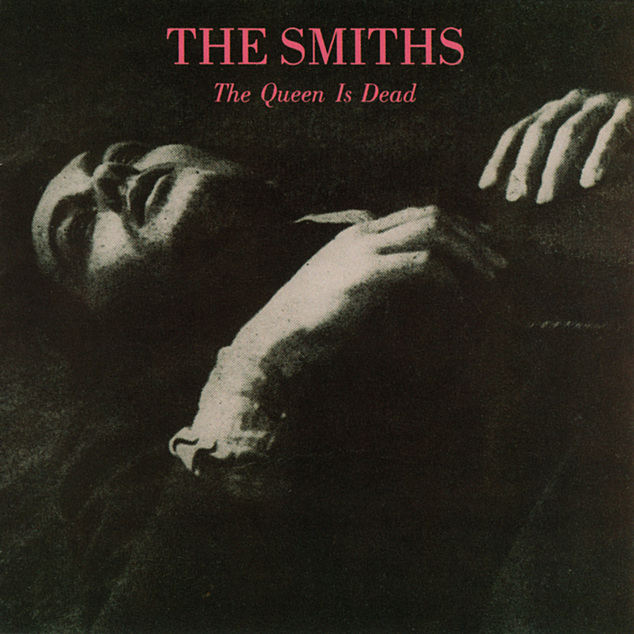
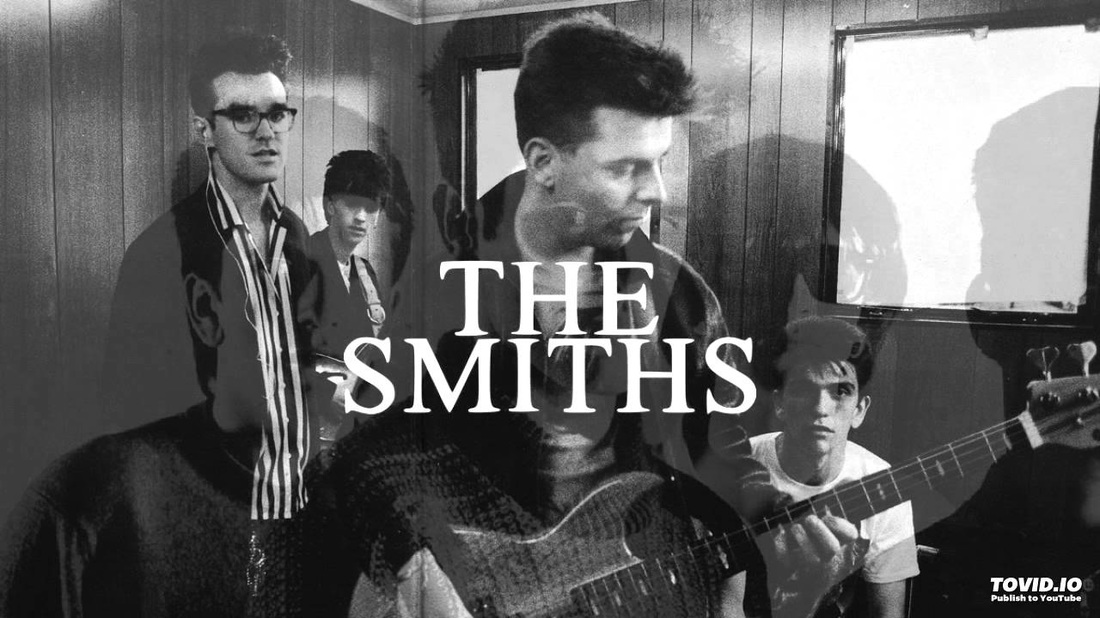
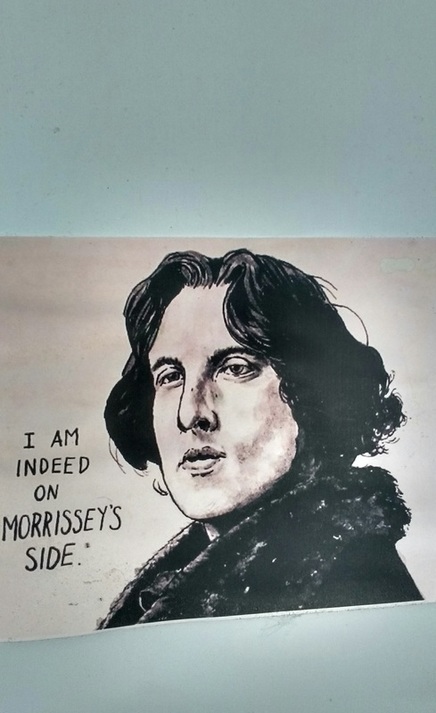
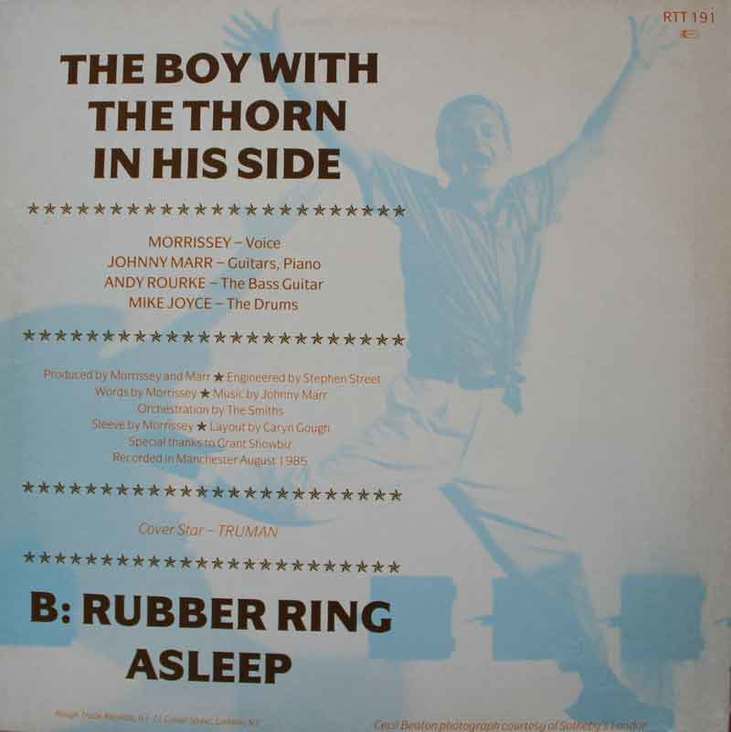
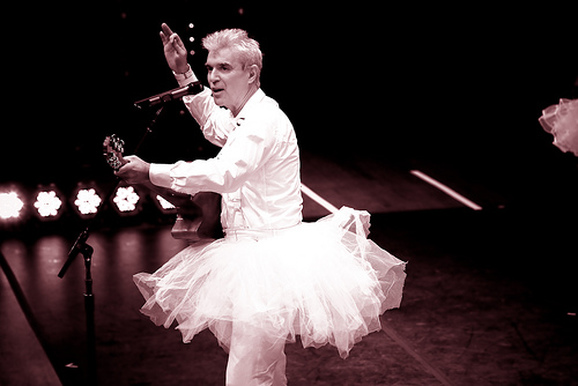
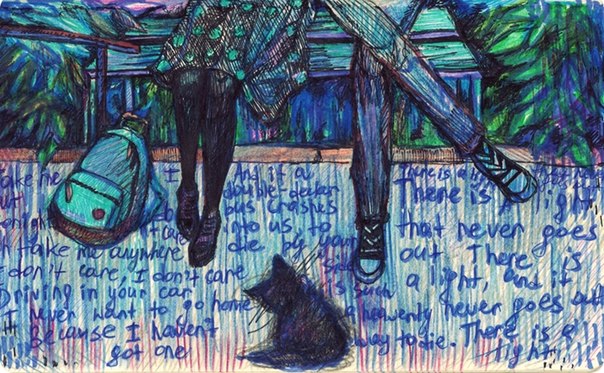
 RSS Feed
RSS Feed
